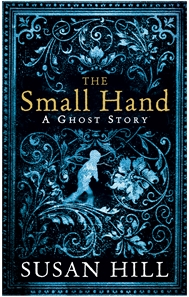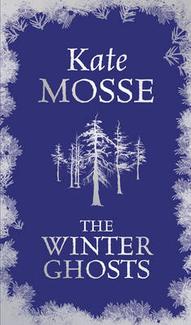 This book should have been right up my alley. It ticked all the boxes for a satisfying read. Narrator (antiquarian book dealer) stumbles into an old neglected garden and then feels a ghostly child’s hand take hold of his, a family secret, a possibility of madness, the ramping up of the haunting mixed with the searches for rare manuscripts and a remote monastery in France. Tick, tick, tick. It’s hardly original but handled well it can make for riveting reading, think Sarah Waters’ The Little Friend, Diane Setterfield’s The Thirteenth Tale or Elizabeth Kostova’s The Historian.
This book should have been right up my alley. It ticked all the boxes for a satisfying read. Narrator (antiquarian book dealer) stumbles into an old neglected garden and then feels a ghostly child’s hand take hold of his, a family secret, a possibility of madness, the ramping up of the haunting mixed with the searches for rare manuscripts and a remote monastery in France. Tick, tick, tick. It’s hardly original but handled well it can make for riveting reading, think Sarah Waters’ The Little Friend, Diane Setterfield’s The Thirteenth Tale or Elizabeth Kostova’s The Historian.
So why did I find Hill’s book so dissatisfying? First and foremost it fails in its primary purpose which is to be frightening. The Small Hand just isn’t scary. I’m not sure why this is. It’s not as though Susan Hill can’t write terrifying books – The Woman in Black is deservedly recognised as one of the most chilling ghost stories ever written. I wonder if part of the problem is that the reader doesn’t empathise with the main character, the narrator – he is a rather stuffy, self-satisfied type and perhaps his retrospective reflections  on his feelings of apprehension and fear distance the reader. There are too many “I shouldn’t have done that”, “if I had known”, “that was my last moment of peace”, “it wasn’t a dream, it was real” etc.
on his feelings of apprehension and fear distance the reader. There are too many “I shouldn’t have done that”, “if I had known”, “that was my last moment of peace”, “it wasn’t a dream, it was real” etc.
Another problem may be the novella form. (The Small Hand is 130 pages or so long). Novellas have no sub-plots so they are of necessity a straight-forward telling, missing out on the complications a novel can provide. The Small Hand needed additional complexity to tease the reader more. As it is, the narrative is too obvious and the ending pretty lame. I also have a few quibbles with the standard of writing: repeated words, incorrect usages – a monk in the monastery in France says “for some months we are impassable” about being snowed-in in winter.
If you want an atmospheric ghost story, also in the novella form, Kate Mosse’s The Winter Ghosts is more satisfying, proving that what a novella sacrifices in terms of narrative possibility can be made up via evocative writing.

